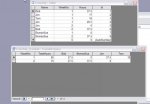Chris Green
58-Year-Old ASBO Material
- Local time
- Yesterday, 16:59
- Joined
- May 10, 2008
- Messages
- 8
I used to be quite a "power user" of Access up to about 7 years ago, then a different job pulled me in another direction altogether (Cycling Instructor!). I'm currently making a database for my employer to keep track of the timesheets for about 24 instructors and it's apparent to me that I've forgotten "quite a lot"!
Naturally I've tables of names and so on, and tables of their timesheet submissions by week number and month. What I'm trying to compile is a crosstab query that will provide me with a sanity check on how many (if any) timesheets I've had from each person per month so I can chase missing ones before the data goes to payroll.
A basic crosstab does the trick for anyone who's submitted at least one timesheet, but it fails to catch those who've sent nothing in. My set up is Column: Name, Row; Week number and Value: Sum of Hours.
I seem to recall that there's a way to "force" nil returns by doing something manual with the column headings but I can't for the life of me remember what it was!
Any advice gratefully received!
Naturally I've tables of names and so on, and tables of their timesheet submissions by week number and month. What I'm trying to compile is a crosstab query that will provide me with a sanity check on how many (if any) timesheets I've had from each person per month so I can chase missing ones before the data goes to payroll.
A basic crosstab does the trick for anyone who's submitted at least one timesheet, but it fails to catch those who've sent nothing in. My set up is Column: Name, Row; Week number and Value: Sum of Hours.
I seem to recall that there's a way to "force" nil returns by doing something manual with the column headings but I can't for the life of me remember what it was!
Any advice gratefully received!

